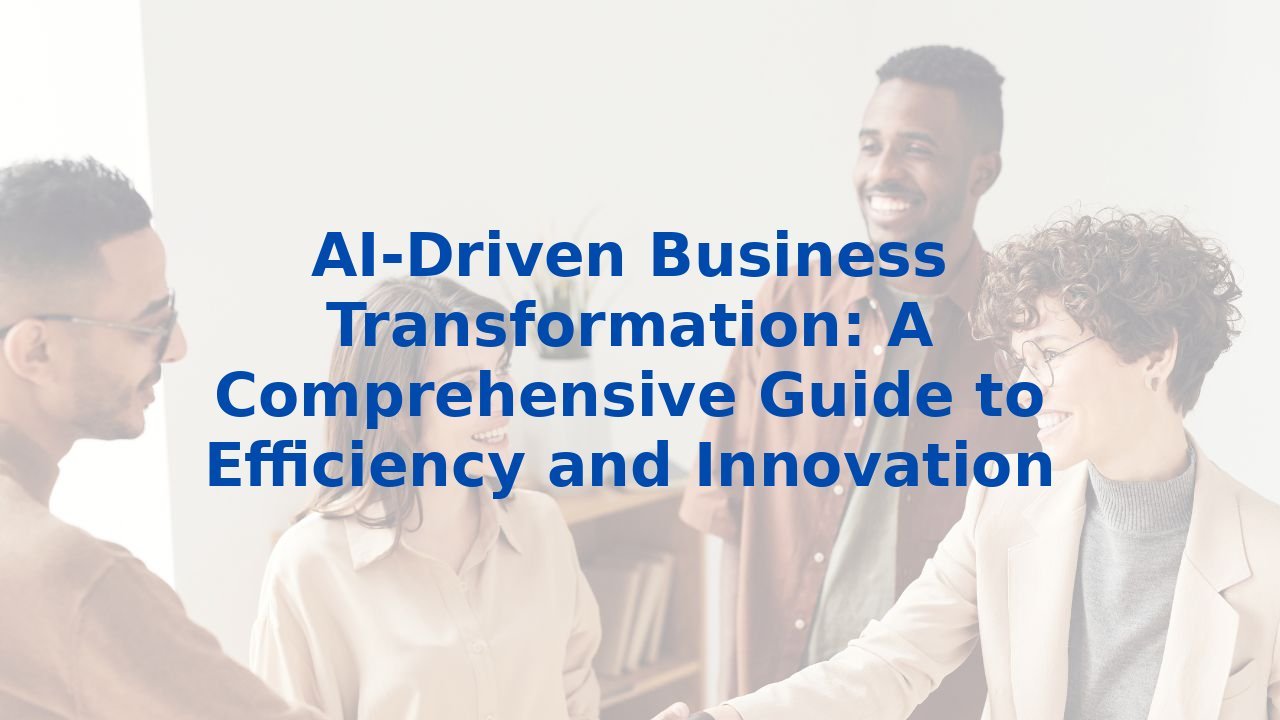AI-Driven Business Transformation: A Comprehensive Guide to Efficiency and Innovation
AI-Driven Business Transformation: A Comprehensive Guide to Efficiency and Innovation
In an age where rapid change is the norm, businesses must stay ahead by adopting innovative technologies that streamline processes and enhance decision-making. One such transformative tool is Artificial Intelligence (AI). By integrating AI into daily operations, organizations unlock a treasure trove of efficiency and innovation, paving the way for a more agile and responsive enterprise.
Enhancing Business Processes with AI
Let’s explore how AI can enhance various business processes, ultimately leading to increased efficiency.
Improving Meetings
Meetings are essential for collaboration and decision-making, yet they often consume precious time due to administrative tasks. AI revolutionizes this process by automating scheduling and capturing crucial discussions. With the help of virtual assistants, teams can focus more on strategy and collaboration rather than getting bogged down in logistics.
Enhancing Sales and Marketing Efforts
AI is making waves in sales and marketing by injecting intelligence into Customer Relationship Management (CRM) systems. By analyzing customer data, AI provides valuable insights, allowing sellers to focus efforts where they matter most. Imagine a sales team armed with predictive analytics—each member can channel their energy into high-potential leads, maximizing their chances of conversion.
Optimizing Customer Service
Elevating customer service is another area where AI shines. While automation has long been utilized for customer inquiries, AI takes it further by analyzing the quality of interactions. By identifying patterns in successful and unsuccessful communications, organizations can fine-tune their human representatives, ensuring they address complex issues effectively while routine queries are handled instantaneously.
Transforming Product Development
The landscape of product development is rapidly evolving, thanks to AI. Generative design processes allow teams to input specific requirements and witness AI exploring all possible design pathways. This capability not only accelerates the development cycle but also eliminates the costs tied to unnecessary prototypes. Businesses can truly innovate when time and resources become less constraining.
Automating Content Generation
Content is king in today’s digital world, and the demand for high-quality, engaging materials is ever-increasing. AI has made substantial strides in generating content, automating the creation of product descriptions, blog posts, and reports that capture audience interest. By leveraging these technologies, organizations can scale their content efforts and sustain a consistent brand narrative without overwhelming their teams.
Streamlining Manufacturing Processes
The manufacturing sector has long embraced robotics, but the newest AI-powered cobots are redefining collaboration on production lines. These robots seamlessly work alongside humans, enhancing efficiency and minimizing errors. Such advancements underscore how AI can complement human capabilities in the pursuit of operational excellence.
Optimizing Business Processes
Business process optimization finds a new ally in AI and machine learning. By evaluating data to automate repetitive tasks, AI not only reduces manual errors but also provides actionable insights that aid decision-making. Process mining tools allow organizations to pinpoint inefficiencies and apply targeted improvements—our futures will be shaped by those who harness AI effectively.
Benefits of AI for Business Efficiency
AI's potential to elevate business efficiency is astonishing. Let’s highlight some of the transformative benefits:
- Streamlined Workflows: Fewer manual interventions through automation lead to optimized processes and enhanced productivity.
- Intelligent Automation: AI-based automation tools assume repetitive tasks, allowing employees to engage in more complex decision-making.
- Generative AI for Innovation: From creating new content to developing fresh concepts, the possibilities are limited only by our imagination.
- Predictive Analytics: Data-driven insights sharpen decision-making and help organizations navigate challenges proactively.
- Real-Time Monitoring: Continuously assessing processes allows for agile responses, keeping operations running smoothly.
The Importance of Training for AI Integration
While the benefits of AI are undeniable, the real magic happens when employees are equipped with the right knowledge and skills. Effectively integrating AI into an organization requires a foundation of training:
Understand AI Tools
It’s imperative that teams understand how to work with AI technologies. By focusing on learning the tools available, employees gain the confidence to integrate AI into existing workflows effectively.
Develop Data Analysis Skills
The AI revolution generates vast quantities of data. Employees must become adept at interpreting this information to harness AI’s full potential. Educational programs can bridge the gap between data generation and actionable insights.
Enhance Decision-Making Abilities
AI aids in decision-making by providing critical insights and simulating various scenarios. Training ensures employees can leverage these analytical capabilities and make well-informed choices that propel the organization forward.
Cultivate Adaptability
As AI evolves, so should your workforce. Ongoing training helps to instill adaptability and openness to new technologies, enabling a culture of innovation and agility.
Conclusion
In closing, embracing AI is not merely a choice but a necessity for organizations eager to stay competitive in a rapidly changing market. By enhancing business processes, fostering innovation, and equipping employees with the necessary skills, companies can unlock unprecedented levels of efficiency. As we stand on the brink of a new era shaped by AI, remember: the journey to transformation starts with a single step towards integration and training.



